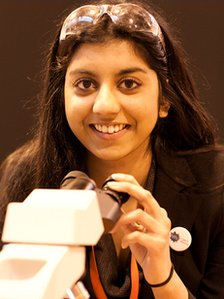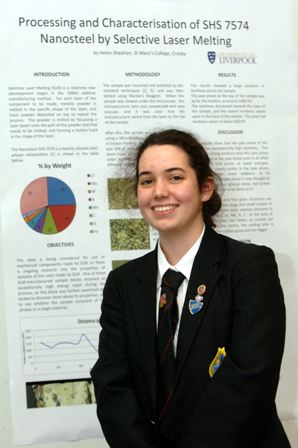A student who was part of a University of Liverpool research project has been crowned as `UK Young Scientist of the Year’.
West Kirby Grammar School’s Kirtana Vallabhaneni beat 360 other entrants to be awarded the prize at The Big Bang Fair at Birmingham’s NEC.
The 17-year-old student worked with Dr Eithne Costello’s project team at the Institute of Translational Medicine on a project aimed at identifying ways to target chemotherapy to pancreatic cancer cells.
Kirtana hoped her win could help ‘instil the same kind of passion I have for science in other young people’.
Dr Costello said: “Kirtana demonstrated the sort of creative and investigative skills needed to be a scientist during her time working with the pancreatic cancer research team. We are delighted that she won this competition, and wish her every success with her future career in medicine.”
Another student who worked with the University of Liverpool, Helen Sheehan from St Mary’s College in Crosby, was highly commended by the panel. Helen worked with Dr Matt Murphy in the School of Engineering on a project examining the physics of new materials for engineering applications.
Helen was also one of three students, selected on the night, who won a place in the European Union Contest for Young Scientists representing the UK in September. Matt said: “This is a wonderful result for Helen, I am so proud of all the work she has put into the project and wish her well in September.”
The judging panel for the national award, open to 11 to 18-year-olds who completed a science, technology, engineering or maths project, included renowned space scientist Dr Maggie Aderin-Pocock, Nobel Prize winning biochemist Sir Tim Hunt, and the Science Museum’s inventor in residence Mark Champkins.
Dr Aderin-Pocock said “The country’s science and engineering industry has an incredibly bright future ahead of it if Kirtana, Helen and their fellow finalists are anything to go by. It’s these talented individuals who will inspire others to think about science and engineering in a new and exciting light.”


Kirtana’s work was exemplary – a significant contribution to the overall effort of the Liverpool NIHR Pancreas Biomedical Research Unit